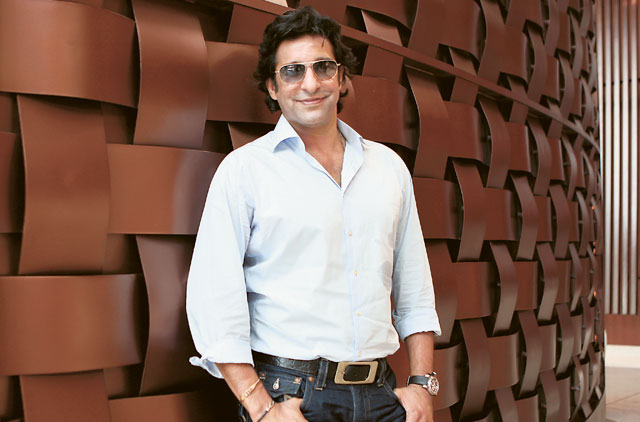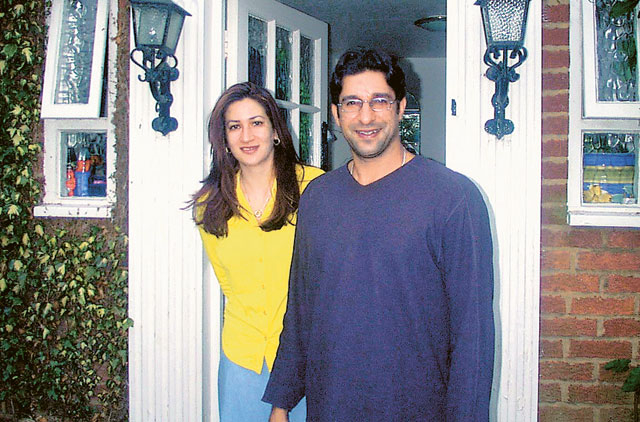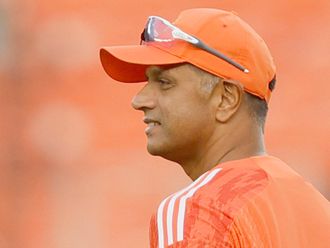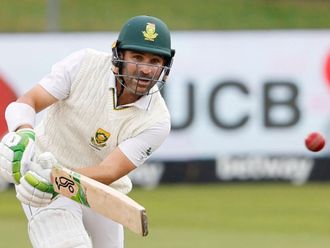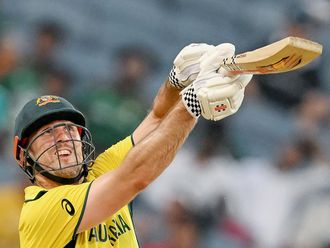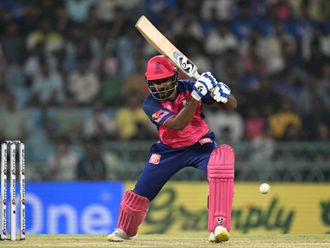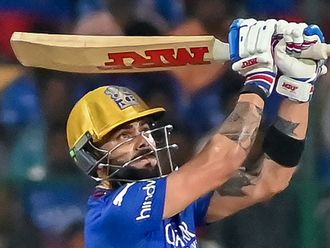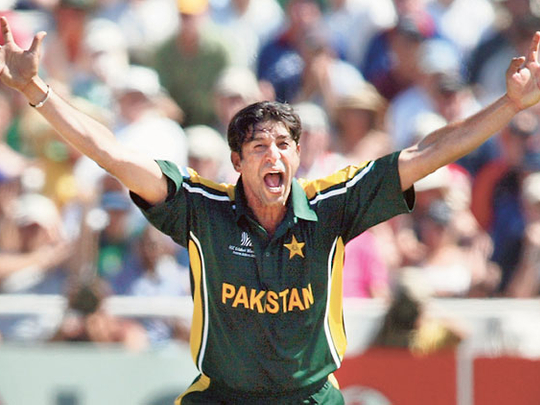
Time spent in the company of Wasim Akram is like going through several re-runs of the movie Big, in which Tom Hanks professes a wish to grow up to be a magical fortune-telling machine and is propelled into adulthood overnight.
Akram's story runs on similar lines.
Truth can sometimes be stranger than fiction. Akram, when we have crossed paths socially and professionally, has often given the impression that he longs to return to a childlike existence, but has successfully settled down to dealing with an inescapable maturity — an experience that has made him complete as a human being and a cricketer.
Perhaps the time when Akram articulated with clarity to me as a cricketer was when England were placed at 4 for 141 in the 1992 World Cup final against Pakistan. Allan Lamb was thriving in a 71-run partnership with Neil Fairbrother, following a collapse at 69 for four, Imran Khan then gave the ball to a youngster, who was later crowned as the most complete left-arm fast bowler ever, in the hope that he could provide a vital breakthrough.
The two deliveries that were bowled after this — to Lamb and Chris Lewis — wrote the fate of the final.
Akram hustled in from around the wicket and produced two deliveries that were smeared in magic.
They were similar in description — inswingers that whistled through the air, screaming on to the stumps, with a destructive arrangement of speed and movement. The ball crashed onto the wicket leaving both batsmen mystified. At 6 for 141, Pakistan had virtually confirmed their status as world champions.
Having exploded into the game like a comet in 1984, Akram quit in 2003. Though there is scant recognition sometimes for sportsmen who retire he continues to remind us that he is still a potent force looking to complete some unfinished business.
The 45-year-old retired icon has registered a steady development. His persistence as a bowler has carried through off the pitch. Working his way through life's experiences, as a fast bowler, young superstar, controversial captain, a diabetic, husband, father, commentator, widower and ambassador for Pakistan cricket, Akram reminds us that in every great story there is conflict and triumph.
Such is the essence of his attraction that he took desire, brashness, volatility, ambition and spilt them not just on the centre of the pitch, but along the boundaries on which he often walked and lived.
In Dubai to lead a walk on diabetes awareness orchestrated by the Landmark Group, Akram did not hesitate to talk confidently about his life.
Gulf News: In between the time you spent playing, then retiring and becoming a professional cricket commentator did you ever stop to analyse your contribution to Pakistani cricket? On how important you were?
Wasim Akram: Nobody has asked me this question before. Yes, I have tried to do a bit of introspection a couple of times. I think that whatever I have done after retirement in the last few years has somehow made me forget my achievements as a cricketer, especially as a cricketer who played proudly for Pakistan. Moreover, no one has ever reminded me about my contribution to Pakistan cricket which is a pity. Looking back, however, I am quite content and happy that I did something positive. I played the game for 19 years, had good mentors like Imran [Khan] and Javed Miandad. I learnt a lot from them. I believe that whatever I have learnt I have passed on to the younger generation of cricketers
So what made you decide to become a commentator? It's a bit of a trend these days among retiring cricketers…
Obviously I was a bit unsure and in two minds on what I would do post retirement. There was no concrete plan that I had made and was going to follow. Sportsmen seldom have set plans on what they should do day-by-day after they retire, but then my late wife Huma said that the best thing I could pursue was cricket commentary — she thought that this was all that I knew. I argued with her saying that doing commentary meant a lot of travelling and analysing the game from very close quarters, but she said, ‘Wasim, believe me, you will thank me after doing this for six to eight months. You will say ‘Huma, thank God you suggested this'.' ‘You will have the same lifestyle and plus you will be talking about a sport that you have loved and played all your life'.
I think Huma's advice was a big turnaround for me. ESPN signed me up straight away and helped me to develop my commentating skills. It was a difficult job to learn English and to make comments on the game — kahan pe kya bolna, aur kahan pe kya nahi bolna [what to say and what not to say on occasions]. I am enjoying it now. I have really got into it, thanks to friends like Ravi Shastri, Sunny [Gavaskar] bhai. They have been great colleagues and great friends.
It's quite interesting being a cricketer-turned commentator, isn't it? Liberating in a sense because when you are playing you cannot be too critical about situations. Now you can speak your mind without fear.
I actually do love it. As long as a commentator doesn't get personal. I believe that people are not stupid in this day and age, so if you have to say that something is black then say it and if it is white then stick to that thought. You can't just be a goody-goody all the time. I speak my mind out. If I spot a cricketing mistake being made on the field then I will speak out. That's what I have learnt from people like Ravi Shastri, Gavaskar, Harsha Bhogle and Allan Wilkins. They have helped to sharpen me up. You see when you play cricket then you tend not to go into the little details as much. But when you are sitting out as a commentator then you spot the small details.
What else do you plan to do in the future? Did you ever stop to think that perhaps you could have given back a lot more to Pakistan cricket and not just be a commentator. The game back home could have used your services.
Yes, Pakistan cricket can still use my services and expertise. But they have to ask me! Kisi ne na kaha hai abhi tek [no one has asked me till now] either this board, or the previous one. The thing is that I don't have to be a coach of the Pakistan team to help Pakistan cricket.
I once proposed an idea to them saying that when I am back home I often do nothing. I stay in Pakistan for a month at the maximum so why not send me 10-12 bowlers who you think could play for the country. Let them be with me for a month, 3-4 hours every day. I could teach them about training, running, developing one's mental strengths, how much bowling to do every day. But I am yet to receive a response from them. I am not the kind of person who wants to call in favours by requesting an appointment with the chairman of the Pakistan Cricket Board [PCB]. But in an overall sense, I want to contribute to cricket itself and not just Pakistan cricket. Cricketers from all over the world come to me and I impart whatever knowledge I have.
Do you think that not utilising the best of what you have to offer is a tragedy?
Pakistan cricket is full of tragedies [laughs loudly]. So that's the irony. I am there and available. I have told them I can help them and the captain off the field. Teach them how to handle the team when they are under pressure, how to handle the media, how to handle the senior players in the squad. Remember when I was the captain I had players like Javed Miandad, Salim Malek and Rameez Raja — they were senior to me and not very easy to work with, especially if you were a captain at the age of 24. I could teach a player who is being groomed for the captaincy quite a few things.
So what you are offering is the best solution it seems. History is proof that whenever a former player gets into the administration of the game in Pakistan he gets sucked into controversy.
I won't name any coach but you will be able to know who they are [laughing]. The problem I have with the Pakistan coaches is as soon as they come into the team they want power. This is unreasonable. Look at someone like Gary Kirsten — has anyone ever seen him? He sits at the back of the dressing room and never interacts with the press unless necessary. And whenever he speaks he talks sense. So what is a coach going to do with power, bhai [brother]? There is a captain and the coach should assist him. Be heard occasionally, but not seen. The captain is the leader so help the captain! The coach cannot be in front of the captain expecting that he should be followed. This is the problem with Pakistan cricket. It has happened in India before as well which is why they went in for the appointment of a foreign coach. Professional foreign coaches are neutral, they do not belong to camps.
In terms of controversies, fragile egos and internal misunderstandings the Pakistani cricketers have been in the limelight and for all the wrong reasons. Is this peculiar just to Pakistan cricket, or does it happen with other teams as well?
It's a problem with Pakistan cricket. There's always too much happening. Chairmans come and go, then the incoming chairman makes every single decision, there is professionalism, the boys are lost and when you are lost you do stupid things. This is the problem with Pakistan cricket. The players are lost.
Shahid Afridi takes the country to the World Cup semi-finals, but when he comes home they change the captain. I don't understand this!
If you don't do salaam [salute] to the chairman then you are in danger of losing your job. Tell me, where does this happen in any other part of the world? Mo'en Khan got sacked like this. One day he was the captain and the next day he was out. I have seen it with my own eyes. How can Pakistani cricketers be consistent when the leaders themselves are inconsistent? Discipline begins from the top.
If there is one factor that you could pinpoint which acts as a catalyst towards generating controversy in Pakistan cricket what would it be?
It is the lack of administration. Every decision is taken by the chairman. This cannot be part of his job. A chairman can have three former cricketers, without any affiliation to the PCB, assisting him on cricketing matters and the Board should be run as a company. There are selectors, there is a coach and there is a captain. It's a simple game and it can be run very simply.
Potentially, in terms of raw talent, Pakistani cricketers are the best in the world. But what they lack thereafter is guidance. Do you agree?
Definitely. When I made my debut, I was only 17 years old, and just in college. I had never been out of Pakistan, but I had seniors like Miandad who taught me how to be street smart, I had Imran who taught me how to be consistent and affirmative and Mudassar [Nazar] who taught me chalaki [being shrewd]. And then we had a Pakistani team which had Shoaib Akhtar for three years! Who wants a mentor like Shoaib Akhtar? That's where the boys got disorientated.
Did you feel that you grew up playing cricket, or did your maturity as a human being come about post-retirement?
I grew up after I retired. I think when I started playing and till the age of 37, I had evolved to an extent as a cricketer. But I developed as a person after retirement. I learnt a lot more, about the game, my own personality, about people. I came to realise one thing: pyaar se duniya mein kuch bhi ho sakta hai [one can achieve so much with love].
When I met you in Colombo in 1994 you said that the whole world opened up for you when you played for Pakistan. Can I turn the question around now and assume that the world actually opened up for you after you quit cricket?
Yes, it actually did happen that way. When you play cricket you tour, go to the hotel, go to the ground, practise, play the match and leave. You hardly socialise and meet people for long periods of time. After retiring I went to India a lot since I had friends there. We all used to meet up after the game. I savoured different cultures, met different cricketers and people. We spent long periods of time together and this makes you evolve as a human being. And I certainly did.
What would you rather be subjected to - pressures on the field, or the pressures of staying away from the game?
I think each option has its share of fun. I had my time and luckily I am over it. I haven't missed being away from cricket for a single day and thank God for that. I did well and got a good job after that and got busy. I believe in developing over time, in behaving your age and that's what I have learnt as well.
Were you nervous about retirement, about what the future would hold for you?
I was big time nervous! Kya karonga. [What should I do?] Should I opt to become a commentator? Did I have the patience to sit in the stadium for days on end talking about a cricket match? One gets mentally very tired….
The life span of a sportsman is very short…
If you are an Indian cricketer in this day and age then you could be fairly comfortable after retirement. Like say, for instance, someone like Sachin Tendulkar. He doesn't have to do anything after he quits. When we won the World Cup the prize money was A$40,000 [Dh142,668] and this was to be shared between 15 players and five officials — so we got A$900 each. This year's winner's purse was $2.5 million (Dh9.17 million)! Yes, I was very stressed before retiring because I didn't know what I would actually do. But luckily Huma gave me the right advice.
Dealing with fame and life after the game - did you get used to the gradual scaling down in the popularity levels?
I haven't seen a change since I retired. I haven't seen a change in people's attitudes in the past 10 years and thank God for that. I get received warmly wherever I go, but maybe in another five years I can get a better sense of my own status and how people react to me.
Retirement has made you more approachable. You cannot be so flexible as a player….
This is true. I am very open, easygoing and relaxed. I don't get angry when people intrude my space any more.
In 1994 you confessed to having a childlike mentality - curious and restless. Your wife Huma was the stabilising factor in those days…
Yes, I was always very impatient and wanting to do things. Today I have mellowed down a lot. I stay at home. I have two boys to look after so this change came about 6-7 years ago. I relax, read and avoid meeting people on a regular basis. I go for a run and just try and be on my own. I believe in behaving my age. I can't think of doing the things I did 10-15 years ago. It just won't suit me and my health.
Talk to me about being a single parent: you have the burden of supporting your kids when they are growing up without the guiding presence of their mother….
I am a both a father and mother to them. It's not the same but I have to juggle the responsibilities. I have learnt a lot in the last two years since Huma passed away. It has been tough and it is still very tough. When my youngest son asks me certain questions about his mother I don't know how to respond. I get challenged when I have to organise their homework. Such things frustrate me. But I received a lot of support from my in-laws. I have moved to Karachi now so when I travel they take care of my kids.
On the brighter side, I am getting to know my children a lot more. I can tell when they want something, whether they have done their homework or not. I know their teachers and they give me regular feedback on them. I participate in parent-teacher meetings in school. When I travel I am always on the phone with them.
Do you think that it is fulfilling?
Yes it is. I hardly saw them when I was a cricketer.
Huma was a very strong person. When I first met the two of you, I realised that she could sort you out quite effectively…
She has been a very strong force in my life. I miss her a lot. She's still around somewhere to support all of us. Whatever I am as a person today is because of her. We miss her every second of the day.
You are in town to lead a campaign to spread diabetes awareness. It's tough battling a serious disease and playing top flight sport. You have done well, but people are still ignorant about the disease.
Not just people. I can tell you that educated people are ignorant about diabetes. They think you can only get it by eating sugar! Awareness is important. You can prevent diabetes by leading a disciplined lifestyle.
To say that Wasim Akram performed at the pinnacle of his sport and broke so many records while nursing a serious medical condition would be quite a statement to make, don't you think? What is your message to people who are ignorant?
In Urdu there is a saying jaan hai to jahan hai [if you are alive then the world is yours], otherwise what's the point in living a life which is full of complications, your health is deteriorating, your kidneys are failing and limbs are being amputated? Discipline yourself in order to live longer is what I preach. When people come to me and say that they can't eat their meals without having a biryani I feel like slapping them! Amend your lifestyle. Be healthy and you are going to look good. And if you look good you will feel good. That's my message.
Are your kids interested in cricket?
They don't have a clue about the game! Huma was half Croatian so she was not very aware or interested in cricket. Her dad was from Pakistan but lived in England. When the kids were born, I was always travelling. I tried to get them interested by making them watch occasional games on the television but after some time they would turn around and ask me ‘Can we go?' What can you say after that?
Do you regret this?
Not at all! Imagine your son is playing cricket and then you have to go around asking for favours so that he can get into the team! [laughs] This happens in Pakistan and even in India. At the very beginning you need to ensure that they get noticed. But personally, I have reconciled to the fact that they may never be cricketers. Therefore, they will get my support in whatever they wish to do.
So Wasim what are you looking for in terms of personal satisfaction today?
I have a simple set of goals — looking after my kids is the primary priority. I want to help people and cricketers. I want to be remembered as a nice person. This matters a lot to me.
You have paid the price for fame…
Every time. But it comes with the job.
You have also been a victim of quite a few adverse circumstances.
Yes, I remember when the team rebelled against me in 1994. But I came back and carried on playing.
You have forgiven?
Yes, I have.
But have you forgotten?
Yes, I have. Badla lene ka time kahan hai kisi ke paas [where is the time to extract revenge?] Life is short, so move on. If I actually remember who misbehaved with me 20 years ago then it is me who is the biggest loser.
Who is the one Pakistani cricketer that you feel the most sorry for today.
Definitely the boys [Salman Butt, Mohammad Asif and Mohammad Amir] who are currently in jail in England. But the one I feel most sorry for is Amir. He is a rare talent.
Reminds you of you?
In fact, he is much better than me at his age than I was. He is phenomenal. So that is quite depressing for the whole Pakistani cricketing fraternity.
Captaincy in Pakistan is a double-edged sword. Did this occur to you when you went through your issues?
You see the Pakistan cricket captain has to maintain relations with the board chairman, with the chief selector, have a few players on his side and a chosen few from the media. But ultimately, he has to pay homage to the chairman. What is the need for this? Why does everything have to be so complicated. Why should the chairman worry about the small things? There are others who have also been appointed. Let everyone do their job. In our team the chairman gets involved even in personal issues, like why are two players fighting with each other.
If you remember former chairman Tauqir Zia, he used to get involved in every little detail… everything. If two players didn't talk, he would ask them why they weren't communicating. What's the point in being a security guard when you are a chairman?
So my advice to the current chairman, Zaka Ashraf, is please keep your dignity, do your job professionally and hire professionals to be around you.
Do you think that the lack of money is a factor in influencing players to turn to bad habits?
Pakistan cricketers earn well. They have central contracts. An A grade players earns $40,000 annually. So it's not really about the money, it's about how mature you are.
What is the one thing you could have changed in your life as a cricketer, and as a person?
As a cricketer, I would have focused on my batting a lot more. In my development as an individual I would offer one piece of advice to the youngsters — don't associate yourself with losers. I did that at a point in my career and paid the price for it. Listen to successful people. Associate yourself with people who have done well… who are successful at whatever they do. This will rub off on you eventually.
And this has happened to Wasim Akram?
Yes, this was my goal. I wanted to be like Imran Khan on and off the field. So I set my standards very high and in order to achieve what you want you have to work equally hard for it.
So today's Wasim Akram is a role model for younger cricketers, a father, a mother, a commentator and an ambassador for Pakistan cricket?
I am accessible and available wherever I am. My goal as a person is simple - apart from being a good dad to my children - I just want to be liked. I know I am not liked by everybody, but life's like that. The very least I want people to say about me is ‘there goes a nice guy', when I walk past. That really is everything to me.


